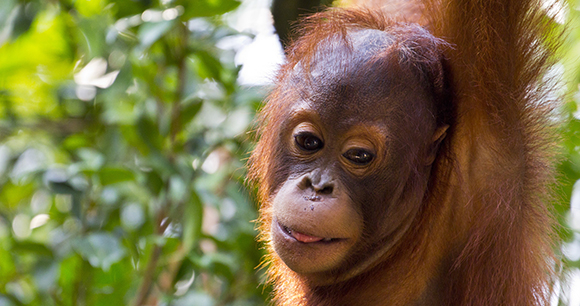
The industrial demand for palm oil has significantly increased within the past five years due to its versatile product function and cost efficiency. Not only is palm oil used as a cooking oil, but it is also one of the key unlikely ingredients to many of consumers’ every day products. This particular oil, which originates from the fruit of the tropical oil palm tree is found in products such as shampoo, soap, beauty and skin products, pet food, cookies, candy and crackers just to name a few. The unsustainable mass production of these products however is causing astronomical consequences for the environment, the people of Southeast Asia and the regions wildlife, including Sumatran orangutan.
Entire native forests have been and continue to be clear cut to make way for the increasing number of palm tree plantations. These native forests are home—the only home—for the arboreal Sumatran orangutan. This destruction of habitat is occurring at such an astounding rate that researchers have predicted that in a decade, the orangutans will be extinct if no alternate palm oil production methods are developed and implemented. During the process in which land is cleared for palm oil plantations, orangutans are either being displaced (forced to find alternative and less quality habitats), burned alive or helplessly hunted and killed or, for young orangutans, captured and sold into the pet trade.
An organization known as the Roundtable on Sustainable Palm Oil (RSPO) has developed stringent criteria for palm oil plantations to promote the growth and use of sustainable palm oil. If palm oil plantation growers meet the RSPO certification criteria then they deemed to be producing their palm oil in a sustainable, efficient manner. Although this process has developed a reputation for being complicated, there have been many major manufacturers such as Nestle and General Mills that have agreed to the RSPO criteria and have been certified.
AWI has contacted approximately 100 major companies regarding the use of palm oil in their products. The following letter was sent out in September/October 2010:
To Whom It May Concern:
The Animal Welfare Institute (AWI) is one of America’s oldest and most respected animal welfare organizations. Among its many programs and campaigns, AWI works on efforts to protect wildlife species both nationally and internationally. Recently, AWI has embarked on a campaign to research the use of palm oil and palm oil products in the manufacturing of various goods available to American consumers. Based on this research, AWI has determined that products manufactured by your company contain palm oil or its derivatives as ingredients.
To further its campaign which, in part, is to compile information on the sources of palm oil and palm oil products used by corporations such as yours, AWI respectfully requests your response to the following questions:
1) What is the source of the palm oil or palm oil products used in the manufacturing of your products containing this ingredient? If there is more than one source used, please identify each source.
2) Is your company familiar with the Roundtable for Sustainable Palm Oil (RSPO), a voluntary association promoting the growth and use of sustainable palm oil? If so, is your company a member of the RSPO? Is the company (or companies) from which you purchase palm oil or palm oil products a member of the RSPO.
3) What policies does your company have in place to determine the environmental impacts or to require the sustainability of the ingredients used in the manufacturing of your company’s products?
Response from General Mills - October 26, 2010
Response from Clif Bar - November 1, 2010
Last Updated: December 7, 2010